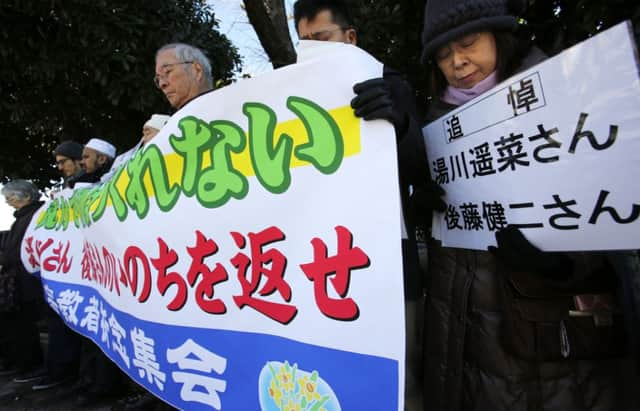Wife of Kenji Goto tells of ‘grief and pride’


In a statement issued through British-based journalist group the Rory Peck Trust, Rinko Jogo requested privacy for her family as they deal with their loss, and thanked those who had supported them.
She said: “I remain extremely proud of my husband, who reported the plight of people in conflict areas like Iraq, Somalia and Syria.
Advertisement
Hide AdAdvertisement
Hide Ad“It was his passion to highlight the effects on ordinary people, especially through the eyes of children, and to inform the rest of us of the tragedies of war.”
Mr Goto left for Syria in late October just a few weeks after the birth of the couple’s youngest daughter. Soon after, he was captured by Islamic State (IS) militants.
Japan has been appalled and saddened by news of Mr Goto’s death following the release of a video showing his killing, purportedly by IS.
Security has been heightened at airports and Japanese facilities overseas, such as embassies and schools.
The government has also called on journalists and others in areas near the conflict zone to withdraw, given the risk of further kidnappings.
Until now, Japan had not become directly embroiled in the fight against the militants.
In parliamentary debate yesterday, opposition politicians challenged prime minister Shinzo Abe’s effort to raise Japan’s diplomatic profile through non-military support for countries fighting IS, which controls about a third of Syria and Iraq.
Mr Abe said he did not see an increased terrorist risk after threats in the supposed IS video, which vowed to target Japanese people and make the knife Goto’s killer was wielding Japan’s “nightmare”.
But he said Japan would not be cowed by such threats.
Advertisement
Hide AdAdvertisement
Hide Ad“The terrorists are criminals,” he added. “We are determined to pursue them and hold them accountable.”
Mr Abe said Japan would persevere in providing humanitarian aid to countries fighting IS extremists.
He added that bowing to terrorist intimidation would prevent Japan from providing medical assistance and other aid it views as a necessity to help restore stability in the region. The failure to save Mr Goto has also raised fears for the life of a Jordanian fighter pilot held by IS.
Jordan renewed an offer on Sunday to swap an al-Qaeda prisoner for the pilot, Lt Muath al-Kaseasbeh, who was seized after his F-16 crashed near the Islamic State group’s de facto capital of Raqqa, Syria, in December.
Government spokesman Mohammed al-Momani said it was “still ready to hand over” prisoner Sajida al-Rishawi, who faces death by hanging for her role in triple hotel bombings in Jordan in 2005.
Al-Rishawi has close family ties to the Iraq branch of al-Qaeda, a precursor of the Islamic State group.
But for Mr Goto’s family and friends, the beheading shattered any hopes for his rescue.
Rinko Jogo said she had received several e-mails from unknown people who were claiming to be her husband’s captors.
Advertisement
Hide AdAdvertisement
Hide AdBut the hostage crisis became a national issue after the militants issued a ransom demand for $200 million (£132m), to be paid within 72 hours, on 20 January.
Later, the militants’ demand shifted to seeking the release of al-Rishawi, who was captured after she survived the 2005 attack which killed 60 people when her explosive bomb belt failed to detonate.
Jordan and Japan reportedly conducted indirect negotiations through Iraqi tribal leaders in a bid to free Kenji Goto.
But late on Friday, the Japanese envoy sent to Amman to work on the hostage crisis reported that there was a deadlock in those efforts.